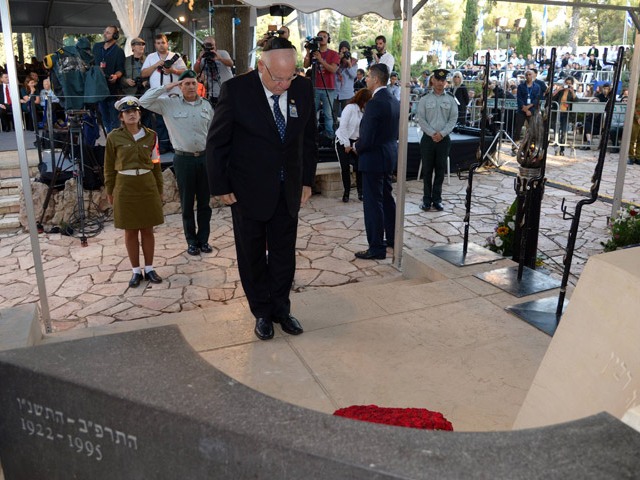President Reuven Rivlin this afternoon (Monday, 26 October 2015), addressed the official memorial ceremony for assassinated
Prime Minister and Defense Minister Yitzhak Rabin, marking 20 years since his murder, and 15 years since his wife Leah passed away. The ceremony was held with the participation of members of the Rabin family, Prime Minister Benjamin Netanyahu MK, Speaker of the Knesset Yuli Edelstein MK, Supreme Court President, Justice Miriam Naor, Leader of the Opposition Isaac Herzog MK, IDF Chief of Staff Gadi Eizenkot, ministers, Members of Knesset, and other community leaders.
 President Rivlin at the gravesite of Yitzhak and Leah RabinCopyright: GPO/Haim Zach
President Rivlin at the gravesite of Yitzhak and Leah RabinCopyright: GPO/Haim ZachPresident Rivlin began his address by noting the symbolism in Rabin's funeral procession having begun at the Knesset and ended at Mount Herzl. He said, "That the procession began at the Knesset, at the very heart of Israel's democracy, was symbolic. Because the three shots that the murderer fired, into Yitzhak's back, did not strike just him, but tore a hole in the heart of, and left a black stain upon, Israel's democracy."
He continued to say, "During these difficult days, days in which we are in a struggle over Jerusalem – in Jerusalem – we stand here today, over the grave of one of the heroes who fought for, and liberated Jerusalem - Yitzhak Rabin, commander of the Harel Unit of the Palmach commander in the Six-Day War, a liberator of Jerusalem."
The President stressed, "Yes, also the Rabin of Oslo, he was the very same who broke through the way to Jerusalem. It was he who united Jerusalem for us, and he, who commanded of us – proponents and opponents of Oslo alike – to safeguard Jerusalem. In 1992, it was Rabin who said at the first session of the 13th Knesset, 'This government, just as those before it, holds that there is no difference of opinion over the status of Jerusalem as the eternal capital of Israel. The complete and united Jerusalem, always was and always be, the capital of the Jewish people, under the sovereignty of Israel. This government is unequivocal in its belief that Jerusalem is not up for debate'." The President added, quoting Rabin, and said, "In Israel, there is agreement on one thing – a united Jerusalem as the continued capital of Israel. In our opinion, Jerusalem is not up for debate, and there can be no peace without Jerusalem.' So said Yitzhak Rabin."
The President went on to emphasize that specifically during the current period, the issue of keeping Jerusalem united was of high importance. He said, "During these difficult days, when we are being asked to relinquish our control of Jerusalem our capital, when there are those who dare to deny the very link between Zion and Zionism, between the mountain, and the house that stood there, between the people and the very core of their being, at the very time discordant voices try to question our sovereignty, and perhaps harder still, at the time when it seems our own red lines begin to blur and fade in the name of bowing to pragmatism, it seems that specifically now, we must remember and hold high the banner of a united Jerusalem."
The President spoke of the importance that Rabin placed in the preservation of a united Jerusalem, and said, "In today's terms, Rabin was a pragmatist. He was the first to say, contrary to my own opinion and that of many others, that, 'There will be no escape from recognizing the Palestinian Authority.' Rabin was prepared to pay a heavy and painful price for his political aims, and yet the realist and pragmatist in him, never encroached upon the idea of a united and complete Jerusalem. On the contrary, in his political vision, Rabin saw the strategic importance, and the eternality of Jerusalem. In strategic terms, Rabin believed that any claim against our sovereignty over Jerusalem was a claim against our presence in our land. In ideological terms, he believed that Jerusalem stood above all other considerations, because there are everlasting bonds which overcome the tests of time. Rabin and Jerusalem were compacted together. Not only is the division of Jerusalem not the way to peace, but it is an obstacle to peace. Forty-eight years have passed since Jerusalem was liberated, and the challenge of uniting the city in practice, and the creation of equality of living conditions between the eastern and western parts of the city remains before us, and palpably so. Today, it is clear to all of us that we cannot continue to ignore the eastern parts of the city, we cannot neglect its existence."
The President concluded by saying, "Today, in the shadow of the bloody events, and political threats, Jerusalem is in special need of those who love her. The city needs those who know, clearly and simply, that Zionism without Zion is an empty shell. Jerusalem has, and will always be in need of those who are unafraid, who are strong enough to endure the troubled path, and the difficult times, as the pioneers who stepped out of the Old City walls and built the modern city, as the defenders of the Jewish Quarter in 1948, and just like Rabin and the liberators of the city in 1967. Today Jerusalem needs us, all of us."